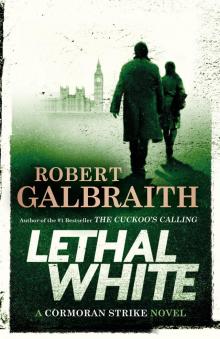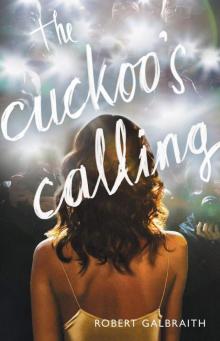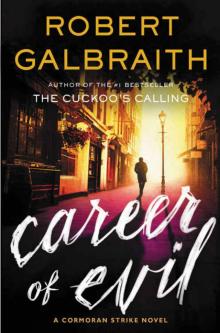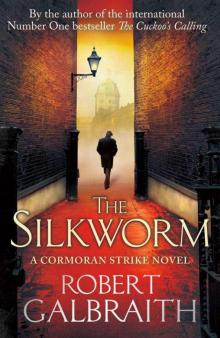- Home
- Robert Galbraith
Career of Evil
Career of Evil Read online
Begin Reading
Table of Contents
Newsletters
Copyright Page
In accordance with the U.S. Copyright Act of 1976, the scanning, uploading, and electronic sharing of any part of this book without the permission of the publisher constitute unlawful piracy and theft of the author’s intellectual property. If you would like to use material from the book (other than for review purposes), prior written permission must be obtained by contacting the publisher at [email protected]. Thank you for your support of the author’s rights.
To Séan and Matthew Harris,
Do whatever you want with this dedication,
but don’t—
don’t—
use it on your eyebrows.
I choose to steal what you choose to show
And you know I will not apologize—
You’re mine for the taking.
I’m making a career of evil…
Blue Öyster Cult, “Career of Evil”
Lyrics by Patti Smith
1
2011
This Ain’t the Summer of Love
He had not managed to scrub off all her blood. A dark line like a parenthesis lay under the middle fingernail of his left hand. He set to digging it out, although he quite liked seeing it there: a memento of the previous day’s pleasures. After a minute’s fruitless scraping, he put the bloody nail in his mouth and sucked. The ferrous tang recalled the smell of the torrent that had splashed wildly onto the tiled floor, spattering the walls, drenching his jeans and turning the peach-colored bath towels—fluffy, dry and neatly folded—into blood-soaked rags.
Colors seemed brighter this morning, the world a lovelier place. He felt serene and uplifted, as though he had absorbed her, as though her life had been transfused into him. They belonged to you once you had killed them: it was a possession way beyond sex. Even to know how they looked at the moment of death was an intimacy way past anything two living bodies could experience.
With a thrill of excitement he reflected that nobody knew what he had done, nor what he was planning to do next. He sucked his middle finger, happy and at peace, leaning up against the warm wall in the weak April sunshine, his eyes on the house opposite.
It was not a smart house. Ordinary. A nicer place to live, admittedly, than the tiny flat where yesterday’s blood-stiffened clothing lay in black bin bags, awaiting incineration, and where his knives lay gleaming, washed clean with bleach, rammed up behind the U-bend under the kitchen sink.
This house had a small front garden, black railings and a lawn in need of mowing. Two white front doors had been crammed together side by side, showing that the three-story building had been converted into upper and lower flats. A girl called Robin Ellacott lived on the ground floor. Though he had made it his business to find out her real name, inside his own head he called her The Secretary. He had just seen her pass in front of the bow window, easily recognizable because of her bright hair.
Watching The Secretary was an extra, a pleasurable add-on. He had a few hours spare so he had decided to come and look at her. Today was a day of rest, between the glories of yesterday and tomorrow, between the satisfaction of what had been done and the excitement of what would happen next.
The right-hand door opened unexpectedly and The Secretary came out, accompanied by a man.
Still leaning into the warm wall, he stared along the street with his profile turned towards them, so that he might appear to be waiting for a friend. Neither of them paid him any attention. They walked off up the street, side by side. After he had given them a minute’s head start, he decided to follow.
She was wearing jeans, a light jacket and flat-heeled boots. Her long wavy hair was slightly ginger now that he saw her in the sunshine. He thought he detected a slight reserve between the couple, who weren’t talking to each other.
He was good at reading people. He had read and charmed the girl who had died yesterday among the blood-soaked peach towels.
Down the long residential street he tracked them, his hands in his pockets, ambling along as though heading for the shops, his sunglasses unremarkable on this brilliant morning. Trees waved gently in the slight spring breeze. At the end of the street the pair ahead turned left into a wide, busy thoroughfare lined with offices. Sheet glass windows blazed high above him in the sunlight as they passed the Ealing council building.
Now The Secretary’s flatmate, or boyfriend, or whatever he was—clean-cut and square-jawed in profile—was talking to her. She returned a short answer and did not smile.
Women were so petty, mean, dirty and small. Sulky bitches, the lot of them, expecting men to keep them happy. Only when they lay dead and empty in front of you did they become purified, mysterious and even wonderful. They were entirely yours then, unable to argue or struggle or leave, yours to do with whatever you liked. The other one’s corpse had been heavy and floppy yesterday after he had drained it of blood: his life-sized plaything, his toy.
Through the bustling Arcadia shopping center he followed The Secretary and her boyfriend, gliding behind them like a ghost or a god. Could the Saturday shoppers even see him, or was he somehow transformed, doubly alive, gifted with invisibility?
They had arrived at a bus stop. He hovered nearby, pretending to look through the door of a curry house, at fruit piled high in front of a grocer’s, at cardboard masks of Prince William and Kate Middleton hanging in a newsagent’s window, watching their reflections in the glass.
They were going to get on the number 83. He did not have a lot of money in his pockets, but he was so enjoying watching her that he did not want it to end yet. As he climbed aboard behind them he heard the man mention Wembley Central. He bought a ticket and followed them upstairs.
The couple found seats together, right at the front of the bus. He took a place nearby, next to a grumpy woman whom he forced to move her bags of shopping. Their voices carried sometimes over the hum of the other passengers. When not talking, The Secretary looked out of the window, unsmiling. She did not want to go wherever they were going, he was sure of it. When she pushed a strand of hair out of her eyes he noticed that she was wearing an engagement ring. So she was going to be getting married… or so she thought. He hid his faint smile in the upturned collar of his jacket.
The warm midday sun was pouring through the dirt-stippled bus windows. A group of men got on and filled the surrounding seats. A couple of them were wearing red and black rugby shirts.
He felt, suddenly, as though the day’s radiance had dimmed. Those shirts, with the crescent moon and star, had associations he did not like. They reminded him of a time when he had not felt like a god. He did not want his happy day spotted and stained by old memories, bad memories, but his elation was suddenly draining away. Angry now—a teenage boy in the group caught his eye, but looked hurriedly away, alarmed—he got up and headed back to the stairs.
A father and his small son were holding tight to the pole beside the bus doors. An explosion of anger in the pit of his stomach: he should have had a son. Or rather, he should still have had a son. He pictured the boy standing beside him, looking up at him, hero-worshipping him—but his son was long gone, which was entirely due to a man called Cormoran Strike.
He was going to have revenge on Cormoran Strike. He was going to wreak havoc upon him.
When he reached the pavement he looked up at the bus’s front windows and caught one last glimpse of The Secretary’s golden head. He would be seeing her again in less than twenty-four hours. That reflection helped calm the sudden rage caused by the sight of those Saracens shirts. The bus rumbled off and he strode away in the opposite direction, soothing himself as he walked.
He had a wonderful plan. Nobody
knew. Nobody suspected. And he had something very special waiting for him in the fridge at home.
2
A rock through a window never comes with a kiss.
Blue Öyster Cult, “Madness to the Method”
Robin Ellacott was twenty-six years old and had been engaged for over a year. Her wedding ought to have taken place three months previously, but the unexpected death of her future mother-in-law had led to the ceremony’s postponement. Much had happened during the three months since the wedding should have happened. Would she and Matthew have been getting on better if vows had been exchanged, she wondered. Would they be arguing less if a golden band was sitting beneath the sapphire engagement ring that had become a little loose on her finger?
Fighting her way through the rubble on Tottenham Court Road on Monday morning, Robin mentally relived the argument of the previous day. The seeds had been sown before they had even left the house for the rugby. Every time they met up with Sarah Shadlock and her boyfriend Tom, Robin and Matthew seemed to row, something that Robin had pointed out as the argument, which had been brewing since the match, dragged on into the small hours of the morning.
“Sarah was shit-stirring, for God’s sake—can’t you see it? She was the one asking all about him, going on and on, I didn’t start it…”
The everlasting roadworks around Tottenham Court Road station had obstructed Robin’s walk to work ever since she had started at the private detective agency in Denmark Street. Her mood was not improved by tripping on a large chunk of rubble; she staggered a few steps before recovering her balance. A barrage of wolf-whistles and lewd remarks issued from a deep chasm in the road full of men in hard hats and fluorescent jackets. Shaking long strawberry-blonde hair out of her eyes, red in the face, she ignored them, her thoughts returning irresistibly to Sarah Shadlock and her sly, persistent questions about Robin’s boss.
“He is strangely attractive, isn’t he? Bit beaten-up-looking, but I’ve never minded that. Is he sexy in the flesh? He’s a big guy, isn’t he?”
Robin had seen Matthew’s jaw tightening as she tried to return cool, indifferent answers.
“Is it just the two of you in the office? Is it really? Nobody else at all?”
Bitch, thought Robin, whose habitual good nature had never stretched to Sarah Shadlock. She knew exactly what she was doing.
“Is it true he was decorated in Afghanistan? Is it? Wow, so we’re talking a war hero too?”
Robin had tried her hardest to shut down Sarah’s one-woman chorus of appreciation for Cormoran Strike, but to no avail: a coolness had crept into Matthew’s manner towards his fiancée by the end of the match. His displeasure had not prevented him bantering and laughing with Sarah on the journey back from Vicarage Road, though, and Tom, whom Robin found boring and obtuse, had chortled away, oblivious to any undercurrents.
Jostled by passersby also navigating the open trenches in the road, Robin finally reached the opposite pavement, passing beneath the shadow of the concrete grid-like monolith that was Centre Point and becoming angry all over again as she remembered what Matthew had told her at midnight, when the argument had burst back into flame.
“You can’t stop bloody talking about him, can you? I heard you, to Sarah—”
“I did not start talking about him again, it was her, you weren’t listening—”
But Matthew had imitated her, using the generic voice that stood for all women, high-pitched and imbecilic: “Oh, his hair’s so lovely—”
“For God’s sake, you’re completely bloody paranoid!” Robin had shouted. “Sarah was banging on about Jacques Burger’s bloody hair, not Cormoran’s, and all I said—”
“‘Not Cormoran’s,’” he had repeated in that moronic squeal. As Robin rounded the corner into Denmark Street she felt as furious as she had eight hours ago, when she had stormed out of the bedroom to sleep on the sofa.
Sarah Shadlock, bloody Sarah Shadlock, who had been at university with Matthew and had tried as hard as she could to win him away from Robin, the girl left behind in Yorkshire… If Robin could have been sure she would never see Sarah again she would have rejoiced, but Sarah would be at their wedding in July, Sarah would doubtless continue to plague their married life, and perhaps one day she would try to worm her way into Robin’s office to meet Strike, if her interest was genuine and not merely a means of sowing discord between Robin and Matthew.
I will never introduce her to Cormoran, thought Robin savagely as she approached the courier standing outside the door to the office. He had a clipboard in one gloved hand and a long rectangular package in the other.
“Is that for Ellacott?” Robin asked as she came within speaking distance. She was expecting an order of ivory cardboard-covered disposable cameras, which were to be favors at the wedding reception. Her working hours had become so irregular of late that she found it easier to send online orders to the office rather than the flat.
The courier nodded and held out the clipboard without taking off his motorcycle helmet. Robin signed and took the long package, which was much heavier than she had expected; it felt as though some single large object slid inside it as she put it under her arm.
“Thank you,” she said, but the courier had already turned away and swung a leg over his motorbike. She heard him ride away as she let herself inside the building.
Up the echoing metal staircase that wound around the broken birdcage lift she walked, her heels clanging on the metal. The glass door flashed as she unlocked and opened it and the engraved legend—C. B. STRIKE, PRIVATE INVESTIGATOR—stood out darkly.
She had arrived deliberately early. They were currently inundated with cases and she wanted to catch up with some paperwork before resuming her daily surveillance of a young Russian lap-dancer. From the sound of heavy footfalls overhead, she deduced that Strike was still upstairs in his flat.
Robin laid her oblong package on the desk, took off her coat and hung it, with her bag, on a peg behind the door, turned on the light, filled and switched on the kettle, then reached for the sharp letter-opener on her desk. Remembering Matthew’s flat refusal to believe that it had been flanker Jacques Burger’s curly mane she had been admiring, rather than Strike’s short and frankly pube-like hair, she made an angry stab to the end of the package, slit it open and pulled the box apart.
A woman’s severed leg had been crammed sideways in the box, the toes of the foot bent back to fit.
3
Half-a-hero in a hard-hearted game.
Blue Öyster Cult, “The Marshall Plan”
Robin’s scream reverberated off the windows. She backed away from the desk, staring at the obscene object lying there. The leg was smooth, slender and pale, and she had grazed it with her finger as she pulled its packaging open, felt the cold rubbery texture of the skin.
She had just managed to quell her scream by clamping her hands over her mouth when the glass door burst open beside her. Six foot three and scowling, Strike’s shirt hung open, revealing a monkeyish mass of dark chest hair.
“What the—?”
He followed her stricken gaze and saw the leg. She felt his hand close roughly over her upper arm and he steered her out onto the landing.
“How did it arrive?”
“Courier,” she said, allowing him to walk her up the stairs. “On a motorbike.”
“Wait here. I’ll call the police.”
When he had closed the door of his flat behind her she stood quite still, heart juddering, listening to his footsteps returning downstairs. Acid rose in her throat. A leg. She had just been given a leg. She had just carried a leg calmly upstairs, a woman’s leg in a box. Whose leg was it? Where was the rest of her?
She crossed to the nearest chair, a cheap affair of padded plastic and metal legs, and sat down, her fingers still pressed against her numb lips. The package, she remembered, had been addressed to her by name.
Strike, meanwhile, was at the office window that looked down into the road, scanning Denmark Street for any sign o
f the courier, his mobile pressed to his ear. By the time he returned to the outer office to scrutinize the open package on the desk, he had made contact with the police.
“A leg?” repeated Detective Inspective Eric Wardle on the end of the line. “A fucking leg?”
“And it’s not even my size,” said Strike, a joke he would not have made had Robin been present. His trouser leg was hitched up to reveal the metal rod that served as his right ankle. He had been in the process of dressing when he had heard Robin’s scream.
Even as he said it, he realized that this was a right leg, like his own lost limb, and that it had been cut below the knee, which was exactly where he had been amputated. His mobile still clamped to his ear, Strike peered more closely at the limb, his nostrils filling with an unpleasant smell like recently defrosted chicken. Caucasian skin: smooth, pale and unblemished but for an old greenish bruise on the calf, imperfectly shaven. The stubbly hairs were fair and the unpainted toenails a little grubby. The severed tibia shone icy white against the surrounding flesh. A clean cut: Strike thought it likely to have been made by an axe or a cleaver.
“A woman’s, did you say?”
“Looks like—”
Strike had noticed something else. There was scarring on the calf where the leg had been severed: old scarring, unrelated to the wound that had taken it from the body.
How many times during his Cornish childhood had he been caught unawares as he stood with his back to the treacherous sea? Those who did not know the ocean well forgot its solidity, its brutality. When it slammed into them with the force of cold metal they were appalled. Strike had faced, worked with and managed fear all his professional life, but the sight of that old scarring rendered him temporarily winded by a terror all the worse for its unexpectedness.
“Are you still there?” said Wardle on the end of the line.

 Lethal White
Lethal White The Cuckoo's Calling
The Cuckoo's Calling Career of Evil
Career of Evil The Silkworm
The Silkworm